
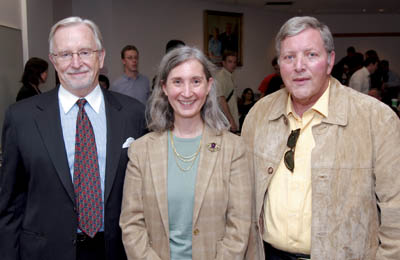
From left to right: Dean Thomas Cooley, Nell Minow, and Jeffrey Haitkin. |
Corporate Governance Guru Nell Minow Delivers Haitkin Lecture
Last fall, Nell Minow, who has been dubbed “the queen of good corporate governance” by BusinessWeek online, delivered the second annual Haitkin Lecture. Minow, co-founder and editor of The Corporate Library, a clearinghouse for information on corporate governance, was introduced by NYU Stern Dean Thomas F. Cooley as “one of the most feared champions of good corporate governance.”
The Haitkin Lecture, hosted by NYU Stern’s Markets, Ethics & Law Program, is made possible through the generosity of alumnus Jeffrey Haitkin (BS ’68), president of J.P. Meredith, Inc., a real estate firm; whose commitment to ethics has fostered this dynamic forum to analyze and debate issues of integrity in the practice of business.
In her lecture, Minow illustrated several examples of corporate malfeasance, exorbitant executive pay, and irresponsible board behavior. She stressed that the essence of corporate governance is to make sure that the right questions get asked, particularly when someone else’s money is involved. Tyco’s board of directors clearly didn’t ask the right questions when former CEO Dennis Kozlowski asked for an employment contract that specifically included language citing that a felony conviction was not grounds for termination – while he was under investigation for tax fraud. At Hewlett Packard, board members did not ask the right questions before signing off on an investigation of leaks that included “pre-texting,” illegal efforts to obtain private personal information. According to Minow, good governance is a matter of judgment, not rules. “It all boils down to the moment, not the structures,” she said.
During her tenure at the Lens Fund – an investment fund that, by leveraging shareholder rights, agitated for change at companies that were not living up to their potential – Minow invested in 22 companies and helped spur the replacement of an equal number of chief executive officers. The fund successfully employed guerilla tactics, such as placing an advertisement in The Wall Street Journal branding one firm’s board as “non-performing assets,” and faxing a controversial corporate employment contract to The New York Times.
Minow advocates that executive pay be tied to performance, and that firms should always be focused on getting returns on investments for shareholders. She cautioned students and alumni to beware of the “seduction of success” – no one wants to speak up when things are going well – and reminded them of the importance of asking good, analytical questions.
Lubin Lecture Series Features Best-Selling Author Eric Schlosser
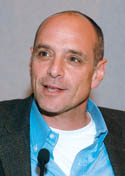 Eric Schlosser, award-winning journalist and author of the international best-seller Fast Food Nation: The Dark Side of the All-American Meal, offered undergraduates, MBA students, and alumni a great deal of food for thought when he visited NYU Stern this past fall. His provocative lecture on the importance of corporate social responsibility was part of the Lubin Lecure Series, which provides a public forum to discuss economic, financial, and management principles and theories.
Eric Schlosser, award-winning journalist and author of the international best-seller Fast Food Nation: The Dark Side of the All-American Meal, offered undergraduates, MBA students, and alumni a great deal of food for thought when he visited NYU Stern this past fall. His provocative lecture on the importance of corporate social responsibility was part of the Lubin Lecure Series, which provides a public forum to discuss economic, financial, and management principles and theories.
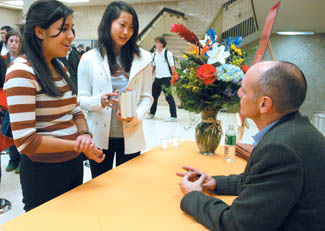
Eric Schlosser signs his international best-seller, Fast Food Nation: The Dark Side of the All-American Meal.
|
“Corporations are the most dominant form of social organization today, and therefore it is critical to examine the moral behaviors these systems encourage,” Schlosser explained to a packed audience in Stern's Schimmel Auditorium. Before discussing three high-profile case studies surrounding the issue of corporate social responsibility (CSR), he noted the two opposing schools of thought on the subject. The first stance was promoted by economist Milton Friedman who criticized CSR and argued that a corporation's principal purpose is to increase its profits. Schlosser, however, advocates the second point of view - that corporations do in fact have obligations to their consumers – and cited Robert Wood Johnson, founder of Johnson & Johnson, as a prime example. Johnson put his obligations to his customers, employees, and community first, and his company is hugely successful to this day.
Schlosser then illustrated three occasions when corporations shirked their moral duties to society and, as a result, harmed millions of consumers. “These three cases are linked by the fact that the products involved kill people and that despite evidence proving health risks, manufacturers continued to market the products to Americans, particularly children,” Schlosser said. He detailed how, in the face of conclusive evidence that tobacco causes cancer, the tobacco industry responded by denying any possible harm to smokers and stepped up marketing campaigns that lied about the safety of nicotine and its addictive qualities. Similarly, when the lead industry discovered the dangerous effects of lead paint on children – including mental retardation – corporate executives refuted the findings.
Finally, Schlosser discussed a case study that is still unfolding. A 2002 report discovered that man-made industrial fats called “trans-fats” clog arteries and are linked to heart disease. Although the FDA has not banned trans-fats nationally, Schlosser praised the New York City health commissioner for his efforts to ban them in the city. In response, the food industry has funded ads objecting to this intrusion into their rights. The debate is ongoing, but Schlosser warned that this example follows the pattern of the aforementioned cases.
Schlosser concluded his discussion by urging students to make conscious decisions when purchasing products and to support companies whose practices are socially responsible. “As future businesspeople, it is unavoidable that you will deal with these critical moral issues at some point,” he said. “Change is possible and necessary, and it begins with each one of you.” Following the lecture, Schlosser answered questions from the audience and met with students and alumni one-on-one while signing copies of his books.
Historians Discuss Entrepreneurship
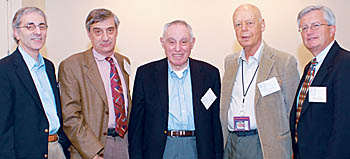
From left to right: Robert Litan, vice president of research and policy at the Kauffman Foundation; conference leaders Joel Mokyr, David Landes, and William Baumol; and Robert Strom, director of Collegiate Entrepreneurship Initiatives at the Kauffman Foundation. |
In October, The Ewing Marion Kauffman Foundation and NYU Stern’s Berkley Center for Entrepreneurial Studies convened a meeting of some of the world’s leading economic historians to discuss the history of entrepreneurship. “We brought together this community of scholars because we believe that history, perhaps more than any other source of evidence, can teach us how to assist the entrepreneur in contributing to the welfare of society,” said William Baumol, Harold Price Professor of Entrepreneurship and academic director of the Berkley Center for Entrepreneurial Studies.
Economic historians from academic institutions in the US, UK, Germany, the Netherlands, France, Canada, and Japan presented 18 papers on the role of entrepreneurs in a wide variety of countries and time periods – from the collapse of the Roman Empire to the medieval economy, and the European Renaissance to the British Industrial Revolution. The immediate objective was to gain a clearer understanding of the difference between innovative and replicative entrepreneurship, and the role of pertinent institutions and public policy in fostering entrepreneurship.
The papers will be published by Princeton University Press in a book co-edited by Baumol, David Landes of Harvard University, and Joel Mokyr of Northwestern University.
|
NYU Stern Honors Ed Altman
 On November 9, NYU Stern honored the 40-year academic, scholarly, and advisory career, as well as the 65th birthday of Edward I. Altman, the Max L. Heine Professor of Finance. In keeping with academia's tradition of the Festschrift, the School hosted an academic conference as well as celebratory lunch and a gala dinner. To mark the occasion, Altman's former students, friends, and professional associates established the Edward I. Altman Fund for the benefit of financial research and scholarship at NYU Stern.
On November 9, NYU Stern honored the 40-year academic, scholarly, and advisory career, as well as the 65th birthday of Edward I. Altman, the Max L. Heine Professor of Finance. In keeping with academia's tradition of the Festschrift, the School hosted an academic conference as well as celebratory lunch and a gala dinner. To mark the occasion, Altman's former students, friends, and professional associates established the Edward I. Altman Fund for the benefit of financial research and scholarship at NYU Stern.
Internationally recognized as an expert on corporate bankruptcy, high yield bonds, distressed debt, and credit risk analysis, Altman was named one of the 100 Most Influential People in Finance by Treasury & Risk Management magazine in 2005. Altman has been educating Stern MBA students on “vulture investing” and “bankruptcy predication” for the past 40 years and currently has more than 50 graduates, known as “Altman's Vultures,” who are established professionals in the distressed debt markets.
Richard Levich, NYU Stern professor of finance and international business, deputy chair of the department of finance, and member of the event's honorary host committee, emceed the lunch festivities, which featured stories from NYU Stern Professors Martin Gruber, Ingo Walter, and Anthony Saunders, and industry leaders such as Markus Lahrkamp of Droege & Co., and Mark Abbot from Prima Guardian and Life.
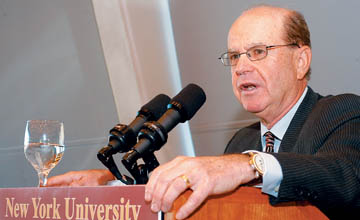
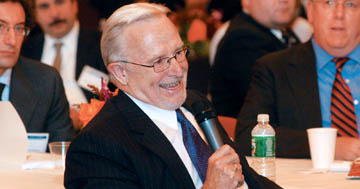
Ed Altman (top) and Dean Thomas Cooley at a celebration of Altman's 40-year career and 65th birthday. |
Martin Gruber, Nomura Professor of Finance, shared the tale of when Altman was hired. After meeting with Professors Gruber, Robert Kavesh, Edwin Elton, and Lawrence Ritter, Altman was offered a job in the budding finance department, because as Gruber said, “Ritter was convinced that he could play shortstop and go to his left.” Ritter was dedicated to baseball and wanted to improve the Stern baseball team as well as the finance department.
The academic conference featured professors from Boston College, University of Massachusetts, University of Michigan, Santa Clara University, Bocconi University, and the London Business School. Topics included an analysis of the risk structure of credit spreads; rating changes and the information content of bond prices; how corporate defaults are correlated; understanding recovery rates on defaulted securities; and implied recovery á la Altman.
The afternoon panels included many of Altman's former students. The first panel: “From Z to A: The Evolution of Credit Risk Analysis,” moderated by Tony Kao (MBA '82), senior managing director, GM Asset Management, and a member of the event's host committee, featured a discussion on the importance of quantitative credit analysis versus fundamental analysis.
“The Evolution of Leveraged Finance, Distressed Debt Investing, and Corporate Restructuring – How Tomorrow Might Be Different” panel was moderated by Allan Brown (MBA '94), co-head of distressed investments and portfolio manager, Concordia Advisors, LLC, and a member of the host committee. The discussion included four NYU Stern alumni: Shelley Greenhaus (MBA '78), president and managing director, Whippoorwill Associates; Geoffrey Gold (MBA '91), partner, Strategic Value Partners; Thomas Carlson (MBA '95), senior vice president, Jefferies & Company, Inc.; and Marti P. Murray (MBA '86), founder and president of Murray Capital Management. The final panel focused on “Automotive Restructurings: The Future of Unions in America” and was moderated by Steven Zelin (MBA '91), senior managing director, The Blackstone Group, and member of the host committee.
More than 450 alumni, academics, and professionals attended the gala dinner, where Brown served as master of ceremonies and many shared stories about Altman. The speakers lauded Altman's contributions to and influence on the distressed debt market, noting that he even has his own Bloomberg function. NYU Stern Dean Thomas F. Cooley commented on how Altman helped put Stern on the map – not just in New York City, but around the globe. Brian P. Smith (TRIUM MBA '03), managing director, Conway MacKenzie & Dunleavy, China, joked that the Z-score, the function Altman devised to predict corporate bankruptcies, has been in existence so long that Altman had a Z-score for the fall of Rome. Marti Subrahmanyam, Charles E. Merrill Professor of Economics and Finance at NYU Stern, pointed out that even though he was one of Altman's few bosses at Stern, Altman never believed that anyone was above him. Instead he had “chutzpah.” “Who else do you know with his stature that would try out for the Cubs?” he joked.
Speakers also included: Tom Carlson (MBA '95), who spoke on behalf of the event's platinum sponsor, Jefferies & Company, Inc.; Jonathan Strasser, music director, InterSchool Orchestras of New York; and Peter Langerman (MBA '80), president and chief executive officer, Franklin Mutual Series Fund.
Altman concluded the event by proclaiming, “I am not retiring,” which was met with thunderous applause. Reflecting on his time at Stern, Altman said, “Forty years in one place and loving it can only happen if you have great people. I have worked with six great deans and six great (department) chairmen. We have the best finance group in the world, and the best students in the world. It is so much fun to be a part of it. I thoroughly enjoy the challenge of teaching such amazing students.”
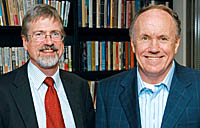
Edward Prescott (right), with Edward Lincoln, clinical professor of economics and director of the Japan-US Center, dispelled common macroeconomic myths in a recent address at NYU Stern. |
Nobel Laureate Edward Prescott Discusses Macroeconomic Myths
Edward Prescott, the returning NYU Stern Shinsei Bank Visiting Professor in Economics at NYU Stern’s Center for Japan-US Business and Economic Studies, hosted a discussion in October that dispelled several macroeconomic myths on topics ranging from the 1990s economic boom, the likelihood of a recession, and the Federal government’s debt load. NYU Stern Dean Thomas F. Cooley introduced Prescott, his former thesis advisor and the 2004 Nobel Laureate in Economic Sciences.
Prescott began the session by proclaiming that, “[former Federal Reserve Chairman Alan] Greenspan (BS ’48, MA ’50, PhD ’77) was not the cause of the 1990s boom, and his monetary policy did not have much real effect on the economy.” Rather, growing industries, such as the technology sector, led to greater investment in intangible capital, which Prescott defines as the expenses incurred by businesses that are not reflected in the bottom line, namely research and development, advertising, and the costs of building new organizations. Using data to underscore his arguments, Prescott contended that because of these investments, the boom was actually larger than what had been reported since investments in intangibles are not always captured on accounting balance sheets.
Next, he debunked assertions that a recession is imminent and that the US government’s debt is too big. Prescott explained that there would be a recession only if one of three things happened: tax rates were increased, regulations and legal constraints lowering productivity were imposed, or the US were to shift to an isolationist mentality. Otherwise, the US has a stable 3 percent real growth rate, which is composed of 2 percent productivity and 1 percent population growth. Prescott, who won the Nobel Prize for his contributions to dynamic macroeconomics, also deflated theories that the current government debt will be a burden on future generations. He noted that privately held, interest-bearing Federal government debt has remained steady at approximately 30 percent since the 1930s.
Summing up his discussion, Prescott warned, “Don’t believe everything you read. Look the numbers up for yourself.” |
Globalization's Next Wave
In December, NYU Stern's Global Business Institute and the World Bank hosted an academic panel discussion about the opportunities and risks that the next wave of globalization may create.
Hans Timmer, lead economist and manager of the Global Trends team in the World Bank Development Prospects Group, and Uri Dadush, World Bank director of the Development Prospects Group and manager of the International Trade Department, presented the findings of the World Bank’s Global Economics Prospects (GEP) report for 2007. The GEP report was followed by a panel discussion moderated by NYU Stern Dean Thomas F. Cooley. The panel included William Easterly, professor of economics at NYU and co-director of NYU's Development Research Institute; Bernard Yeung, Abraham Krasnoff Professor of Global Business at NYU Stern, interim director of Stern's Global Business Institute, and director of NYU China House; and Georges de Menil, professor of economics at the Institute for Advanced Studies in the Social Sciences, Paris, and visiting professor at NYU Stern.
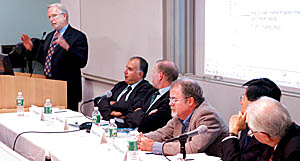
Dean Thomas Cooley moderated a panel on the World Bank's 2007 GEP Report featuring (from left to right) Uri Dadush, Hans Timmer, William Easterly, Bernard Yeung, and Georges de Menil.
|
Timmer said that while the economy faces looming risks, growth in developing countries will remain strong, boosted by enhanced policies and favorable financial conditions. As global integration intensifies, developing countries' share of trade will rise in 2030 to 45 percent of the world's total. Dadush explained that while global economic growth would raise income and reduce absolute poverty, widening inequality between skilled and unskilled workers could cause tensions in labor markets. He cautioned that global institutions and policies are too weak to deal with severe environmental pressures, including global warming, a depletion of fisheries' stock, and an increase in infectious diseases.
Easterly responded with a provocative and contrarian point-of-view on the GEP's report, focusing his remarks on the effect of globalization on Africa. He first argued that 25-year projections are impossible to make and that we know little about policies that raise growth rates. He also contended that the GEP report paints a darker picture about Africa than is warranted. He said that Africa's growth rate is approximately 2 percent, which has been historically true for all developing countries.
Regarding the GEP's outlook on China, Yeung suggested that China will face a productivity problem caused by malfunctioning capital markets; an aging population resulting from its one-child policy; poor health due to pollution, low-quality food, and lack of medical insurance; and educational inequality in rural neighborhoods. Yeung argued that these problems are institutional and that serious changes will not take place unless there is a dramatic economic collapse or a very long period of stagnation. He predicted that these structural problems will lead to a long period of stagnation in China.
De Menil analyzed the GEP report as it relates to Europe and stressed the need for a multilateral approach to address global warming. He cited the Stern Review, a report on the economics of climate change by Nicholas Stern, former chief economist and senior vice president at the World Bank, which projects that by 2050, 200 million people, mostly in coastal regions, will be displaced by global warming.
In his concluding remarks, Dean Cooley pointed out that income inequality could be a result of economic growth and that it is not necessarily undesirable or avoidable.
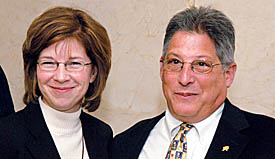
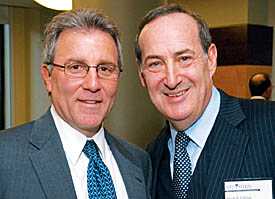
Top: Conference speakers Michelle Weldon (left) and Michael Auerbach; Bottom: Steve Markovitz (left) and Mark Lilling. |
Are Pensions Safe?
Last winter, NYU Stern's Vincent C. Ross Institute of Accounting Research convened leaders from government, financial services institutions, and academia to tackle a timely and controversial issue: Are US pensions safe?
Dean Thomas F. Cooley opened the conference by saying that US pensions are not safe and that pension reform is crucial. In moderating the subsequent panel discussion, Associate Director of the Ross Institute and Clinical Professor of Accounting Seymour Jones cited inadequate funding and corporate deficiencies as factors contributing to the unease.
Mark S. Lilling (BS '72), chief executive and managing partner of CPA firm Lilling & Company LLP, and founder of the Audit Committee Consulting Team LLC, argued that society has a social responsibility to provide retirement income, and that the need will rise as people live longer. Moreover, the significant decline in the number of defined benefit plans available has resulted in a shift in investment responsibility and risk, from employers to individuals. According to Lilling, with the recent advent of the limited scope audit, which doesn't require pension investments and returns to be audited, $1.5 trillion of the $4.5 trillion in pension plans isn't being watched. And the Pension Protection Act of 2006 allowed hedge funds and private equity funds to accept larger investments from pension plans – even though they themselves are not regulated.
Michael Auerbach, chief of the Division of Accounting Services at the US Department of Labor's Employee Benefits Security Administration, noted that overseeing 75,000 pension plan audits is overwhelming for his 13 staff members. John Biggs, former chairman and chief executive officer of TIAA-CREF and NYU Stern Executive-in-Residence, said that IRAs, which are unaudited, hold the largest percentage of pension dollars. Biggs' greatest concern about pension safety is that the American public is now required to manage retirement assets on its own, and expressed concern over the very low contribution rate of young employees. He concluded, “We've found the enemy, and they are us.”
Additional panelists included NYU Stern Professor of Accounting Joshua Livnat, whose research has found that one-third of individuals who are offered defined contribution plans do not enroll. He advocates investment in life-cycle funds, which adjust the mix of stocks and fixed-income investments as investors age. Kenneth Dakdduk, partner, Pension Accounting, Pricewaterhouse Coopers LLP, underscored the utility of financial reports to assess the safety of pension benefits, noting that as of the end of 2006, balance sheets will report the funded status as either assets or liabilities.
Michelle Weldon, of Pricewaterhouse Coopers’ Audit Business Advisory Services unit in Boston, argued that the increased popularity of defined contribution plans, as well as the continued growth of derivatives, hedge funds, and private equity, has resulted in an inability to report plan assets at fair market values.
This Ross Institute Forum was made possible by the generous support of Mark Lilling and The Audit Committee Consulting Team LLC.
Experts Argue Convergence Will Favorably Impact Capital Market Integration
On October 20, NYU Stern's Global Business Institute and Vincent C. Ross Institute of Accounting Research convened leaders from regulatory standard setting bodies, financial market experts, and academic researchers to discuss the ways in which national accounting and regulatory differences affect international capital markets. The full-day conference featured panels on the benefits of convergence – the phenomenon by which countries agree to adopt similar standards – and the relationship between convergence and access to the US capital market.
Robert Herz, chairman of the Financial Accounting Standards Board (FASB) and the luncheon keynote, noted that the US is on the path toward global harmonization of accounting standards. More than a decade ago there was a growing realization that US Generally Accepted Accounting Principles (GAAP) would not work as a universal standard because the rest of the world simply would not accept the American way of reporting. Instead, FASB's priority is to assess both GAAP and the International Financing Reporting Standards (IFRS) to determine which elements from these standards would be globally optimal. Herz emphasized FASB's three-pronged strategy: to improve US standards, to determine whether or not convergence is an improvement over the current accounting standards, and to simplify the US standards. Priority areas of focus include improving standards in revenue recognition and lease accounting, as well as merging US and international conceptual frameworks.
The conference concluded with a roundtable discussion, moderated by Ross Institute Associate Director and Professor Seymour Jones, on how the lack of convergence affects foreign company access to the US capital market. Marti Subrahmanyam, Charles E. Merrill Professor of Finance at NYU Stern, joined William Decker, audit committee chairman of Baidu, Inc.; Jeffrey Singer, vice president, Corporate Client Group, at NASDAQ; and Lynn Turner, the former chief accountant at the Securities and Exchange Commission and current managing director for research at the advisory firm Glass, Lewis & Co. Subrahmanyam argued that US financial markets were losing their dominant position and that US regulations needed to be re-examined. Singer surmised that since the passage of Sarbanes-Oxley, companies are more likely to raise capital and list shares on foreign markets. Turner noted that while the top five IPOs in 2005 were from China – and none were listed in the US – the US has the highest capital market standards and should retain them. Decker asserted that in order for there to be parity in the world market, there needs to be a single set of accounting standards driven by the same fundamental principles.
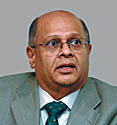 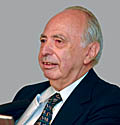 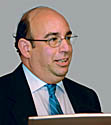
From left to right: Marti Subrahmanyam, Robert Herz, and Seymour Jones discussed how national accounting and regulatory standards affect international markets. |
|
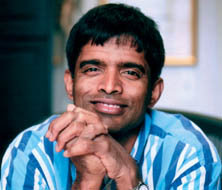 Professor Damodaran Leads Lifelong Learning Workshop on Valuation
Professor Damodaran Leads Lifelong Learning Workshop on Valuation
Aswath Damodaran, professor of finance and David Margolis Teaching Fellow, in October led a Lifelong Learning Workshop entitled “Valuation: Many a Slip between the Cup and the Lip…”. The half-day workshop, sponsored by the Office of Alumni Affairs and attended by many of Damodaran's former students, featured a lecture on the basics of valuation with an interactive discussion, followed by a networking luncheon.
Damodaran began the workshop as he begins all of his valuation classes – by discussing lemmings. These suicidal creatures are much like investors, and the purpose of teaching valuation is to “fight the lemmings.” “Think about the last lemming in the mass suicide,” Damodaran reasoned. “He must have doubts.” But that lemming, much like momentum investors, feels that “the others must know something I don't,” and follows along the cliff until he meets his watery grave.
Momentum investors who value Google at $200 a share note that others are paying $425 for the shares and presume that “they must know something I don't.” The so-called “Yogi Bear” investors who want to run with the crowd but believe they can get out before the going gets tough are much like the lemming who thinks he can stop before he gets to the cliff but doesn't realize that he has already run past it. Damodaran aspires to be the lemming with the life vest, which is where his valuation theory comes into play.
Damodaran believes that the great thing about valuation theories is that no one can prove one wrong. Investors must realize that there is no objective, “true” value – all valuations are biased; the only question is by how much. By its nature, valuation is imprecise, and complexity does not translate into better valuations. “The companies with the most uncertainty have the greatest payoff,” he said.
He described three different approaches to valuation: discounted cash-flow valuation, relative valuation, and contingent claim valuation. Discounted cash-flow valuation relates the value of an asset to the present value of expected future cash flows it will produce. Relative valuation, which makes up the bulk of all valuations, estimates the value of an asset by looking at the pricing of “comparable” assets relative to a common variable (such as earnings, cash flows, book value, or sales). Finally, contingent claim valuation uses option pricing models to measure the value of assets that share option characteristics.
Damodaran offered several helpful hints to those undertaking a discounted cash-flow valuation. To be sure to measure the earnings correctly, investors should focus on the big picture (not the accounting picture) when assessing capital expenditures and working capital. They should realize that the past is not always a good indicator of the future; that the risks of globalization affect emerging markets and developed markets; and that growth has to be earned, not endowed or estimated. And finally, if one behaves as a lemming, he will learn, to his chagrin, that all good things come to an end.
Academics and Practitioners Address Data Governance and Risk Calculation Issues
Last fall, NYU Stern's Center for Digital Economy Research (CeDER), IBM Data Governance Council, and BITS Financial Services Roundtable hosted a forum to bring together practitioners and academics to discuss the most pressing issues associated with governance of data and technologies. The sessions were attended by approximately 35 participants from leading companies and universities, including Citigroup, IBM, JPMorgan Chase, Lehman Brothers, NYU Stern, and The Wharton School of the University of Pennsylvania.
“Data governance and risk calculation are boardroom issues,” explained Vasant Dhar, professor of information systems, deputy chair of the Information Systems Group, and co-director of CeDER, which supports research concentrations that address specific areas of the digital economy, ranging from business intelligence and data mining to interactive marketing. “Organizations put their franchise at risk if they do not adequately consider the value of data and material damages that can result if data are stolen, lost, or used inappropriately by them or a third party, or from failed or missing processes.”
The event was designed to frame these risks quantitatively, define what data should be collected, and to determine how data should be classified by organizations. The program consisted of two keynote lectures, two panels featuring distinguished practitioners, and an open discussion to encourage dialogue among participants. Cathy Allen, CEO of BITS Financial Services Roundtable, and Steven Adler, chairman of IBM Data Governance Council and program director for IBM Data Governance Solutions, gave the keynote lectures.
Allen discussed why the industry needs risk calculation models. She explained that boards of directors and senior executives are demanding better tools and that there has been an increase in fraud and security breaches and a rise in cross-channel payments risk. She said that one in five customers are leaving companies because of security breaches, and that another 40 percent consider doing so. Allen recommended that boards focus on three key IT risks: compliance and control, business continuity, and security and privacy. She suggested that companies add a technology expert to their boards and develop appropriate enterprise-wide risk management policies, procedures, and controls.
Dhar moderated a panel focusing on risk calculation challenges and opportunities, which included Joseph Sabatini, managing director and head of the Corporate Operational Risk Team at JPMorgan Chase; Mike Stiglianese, chief IT risk officer at Citigroup; and Don Wesnofske, chief risk officer for IBM Governance, Risk, and Compliance Solutions. Sabatini said operational risk continues to increase in size, complexity, and volatility due to business growth and expansion, external environmental factors, changes in management initiatives, and greater dependencies on complex products, operations, and processes. Wesnofske discussed the value proposition of operation risk for companies and recommended that companies make compliance a strategy and not a sunk cost. |
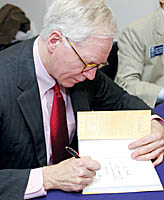 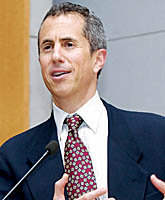 
Carl Schramm (left) autographs his book, The Entrepreneurial Imperative: How America's Economic Miracle Will Reshape the World (and Change Your Life). Danny Meyer (right) discusses his book, Setting the Table. |
Authors Discuss Macro and Micro Views on Entrepreneurship
In a world of increasingly scarce resources, the United States is blessed with a powerful source of renewable energy: entrepreneurship. So argues Carl Schramm in his book, The Entrepreneurial Imperative: How America's Economic Miracle Will Reshape the World (and Change Your Life). “Entrepreneurship is the only uniquely American resource at our disposal,” writes Schramm, president and CEO of the Kansas City-based Ewing Marion Kauffman Foundation, which has awarded grants to NYU Stern to support entrepreneurship programs and research in the field.
In October, Schramm appeared at NYU Stern to discuss his book with an audience of Stern alumni and MBA students at Stern's Author Lecture Series. The lecture, hosted by Stern's Office of Alumni Affairs and The Berkley Center for Entrepreneurial Studies, in conjunction with the Museum of American Finance, was followed by a book-signing reception.
Schramm's argument is rooted in history – recent and past. In the 1970s and 1980s, he explained, the US evolved from a stable economy with predictable growth based on big government, big business, and big unions, to a more dynamic one. The shift was stimulated by stagflation – a 20 percent prime interest rate, 12-14 percent mortgage rates, and a 9 percent unemployment rate. It was also propelled by a series of happy accidents: the ERISA pension reform, which led to a more competitive and mobile workforce, the clarification of intellectual property laws, and the underutilization of intellectual labor. “This shift created a new matrix where entrepreneurship could emerge – an economy now known as post-industrial capitalism or entrepreneurial capitalism,” he said. In this new economy, entrepreneurial risk is reduced. As a result, 1 million new firms are now created in the US each year, and 70 percent of all American jobs are from businesses less than five years old.
A true American entrepreneur, restaurateur Danny Meyer has created more than his share of jobs. And in his book, Setting the Table: The Transforming Power of Hospitality, Meyer, the founder and co-owner of 11 of Manhattan's most influential restaurants, including Union Square Cafe, Gramercy Tavern, Tabla, and The Modern, shares his recipes for success.
“The customer is not always right,” Meyer proclaimed to an audience of NYU Stern alumni and MBA students in November. Meyer, who also appeared as part of Stern's Author Lecture Series, qualified the remark by noting that “while the customer is not always right, he or she must always feel heard.”
Meyer, the CEO of Union Square Hospitality Group, said his business strategy is built on both good service, defined as the technical delivery of a product, and “enlightened hospitality,” which is how the delivery of that product makes its recipient feel. He argued that hospitality is the distinguishing factor for success in this new, service economy. In the information age, when competitors know how to offer the same products and services, the culture and experience companies create for their customers will help them stand out.
To create this hospitable culture, restaurants must hire the right people, said Meyer. He hires “51 percenters” – staff with a high “hospitality quotient (HQ)” whose skills are 49 percent technical and 51 percent emotional. The emotional skills required to create a high HQ are optimism and kindness, curiosity about learning, an exceptional work ethic, a high degree of empathy, and self-awareness and integrity. The most important application of hospitality is to the people who work for you, and then, in descend-
ing order of priority, to the guests, the community, suppliers, and investors. And Meyer believes this philosophy applies not just to the restaurant business, but to any service business. “By putting your employees first, you have happier employees, which then leads to a higher HQ. A higher HQ leads to happy customers, which benefits all the stakeholders. The cycle is virtuous, not linear, because the stakeholders all impact each other.”
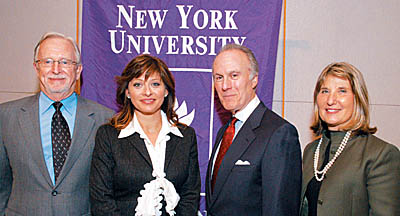
From left to right: Dean Thomas Cooley; Maria Bartiromo; Jonathan M. Herman, Esq., president of the NYU Alumni Association; and Brooke Kroeger, chair of the NYU Department of Journalism.
In October, alumni, students, and friends gathered at NYU Stern for New York University's annual Speakers on the Square Lecture series, co-sponsored by the NYU Stern Alumnae Network, featuring Maria Bartiromo (WSC '89). The host and managing editor of the nationally syndicated business and economic news program, “The Wall Street Journal Report with Maria Bartiromo,” and anchor of CNBC's “Closing Bell with Maria Bartiromo,” Bartiromo shared her views on the economy and investment in global markets. After the lecture, she met with students and signed autographs. |


![]()